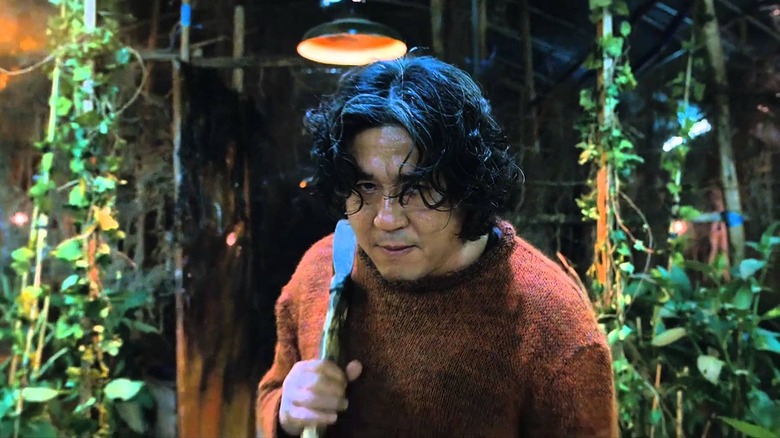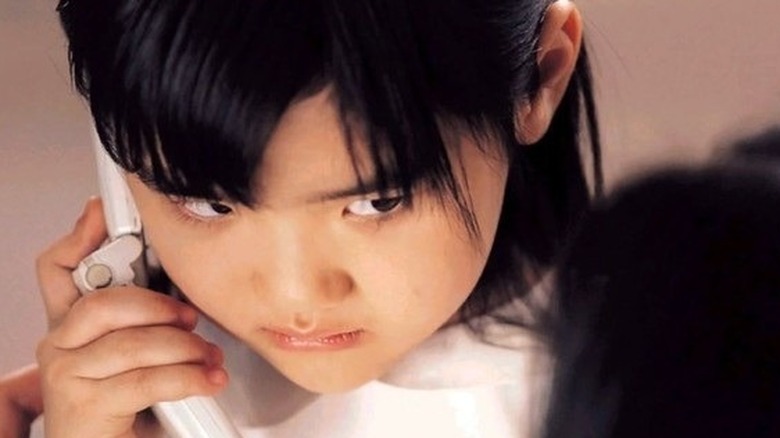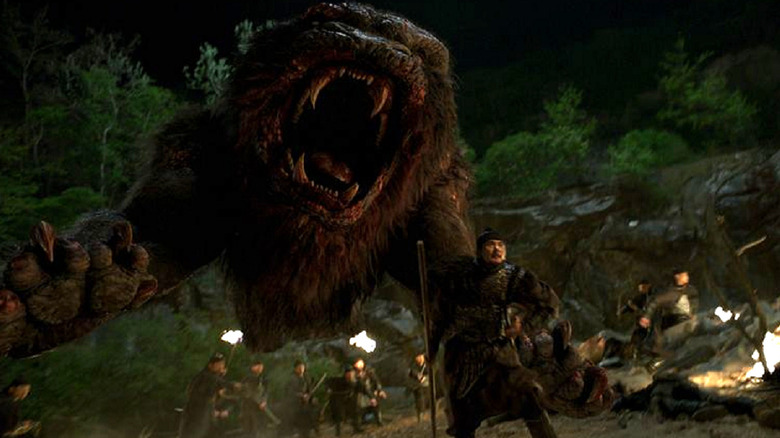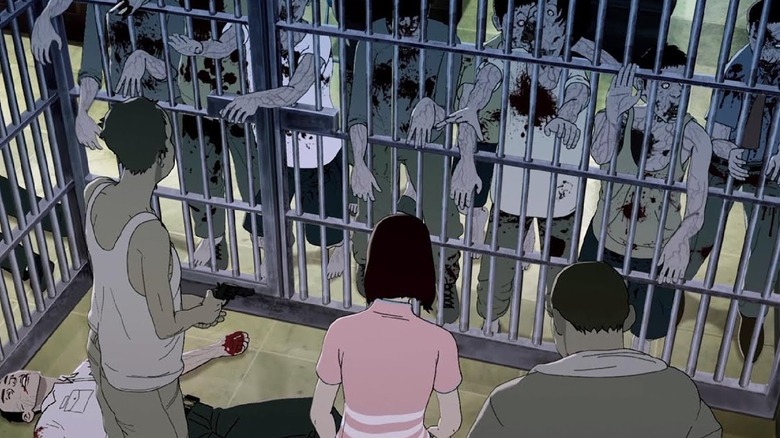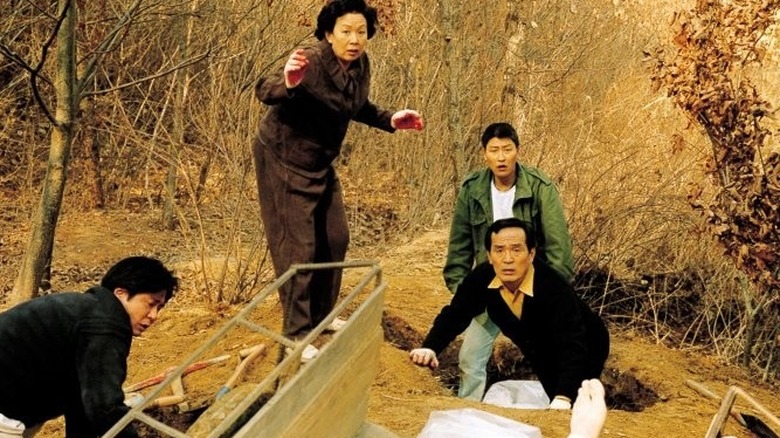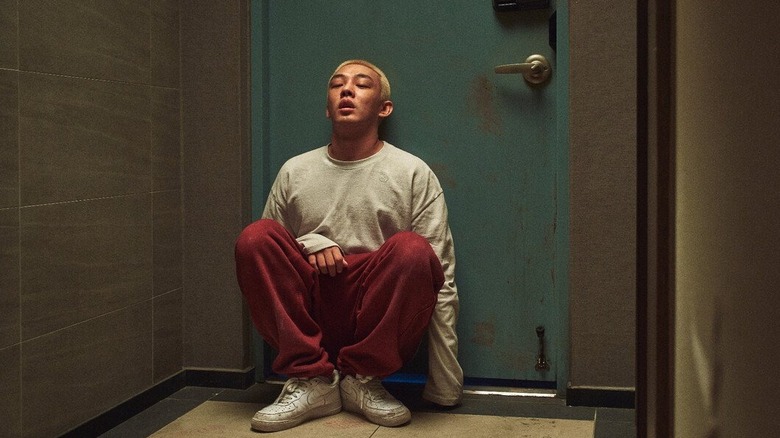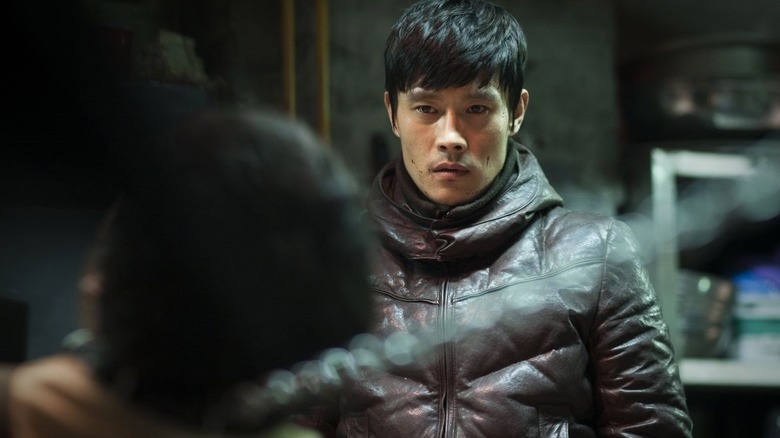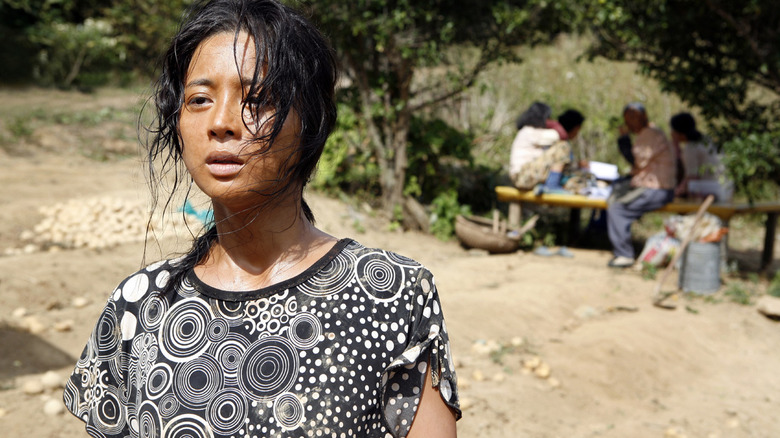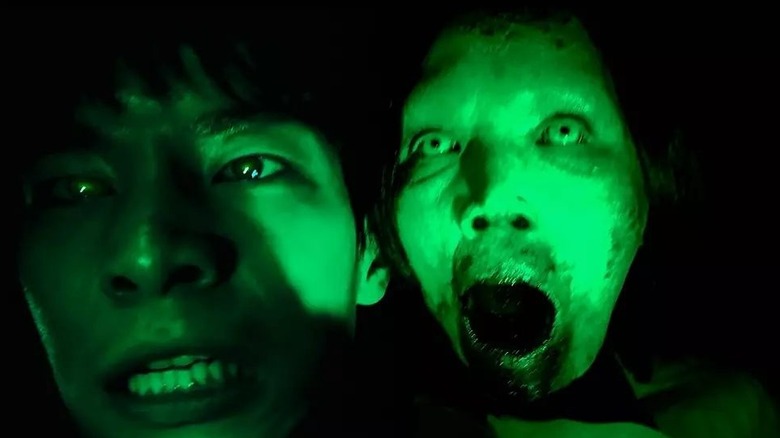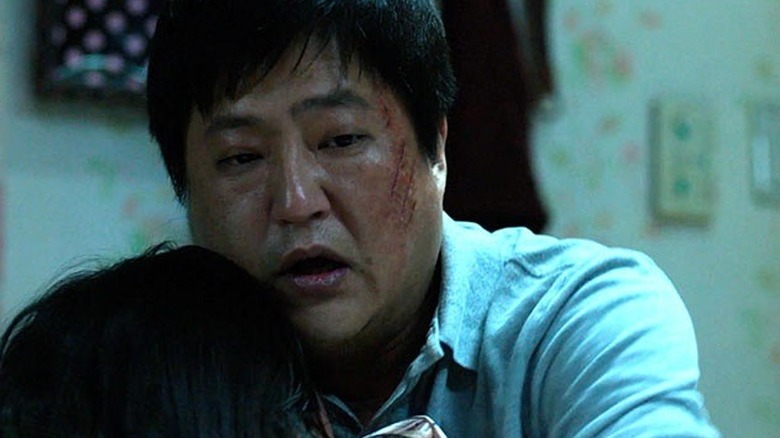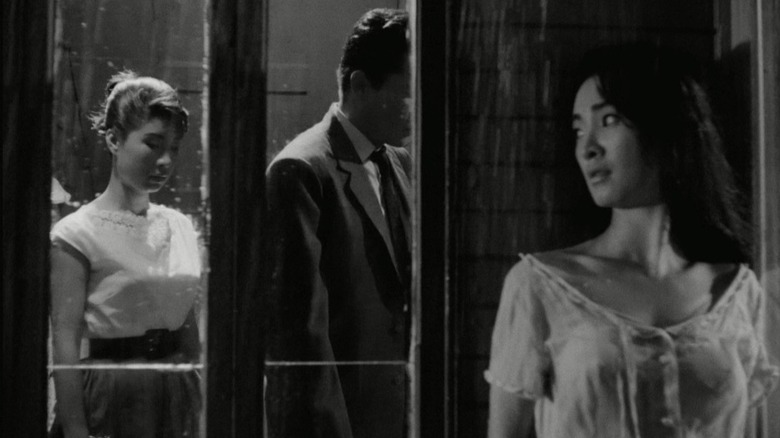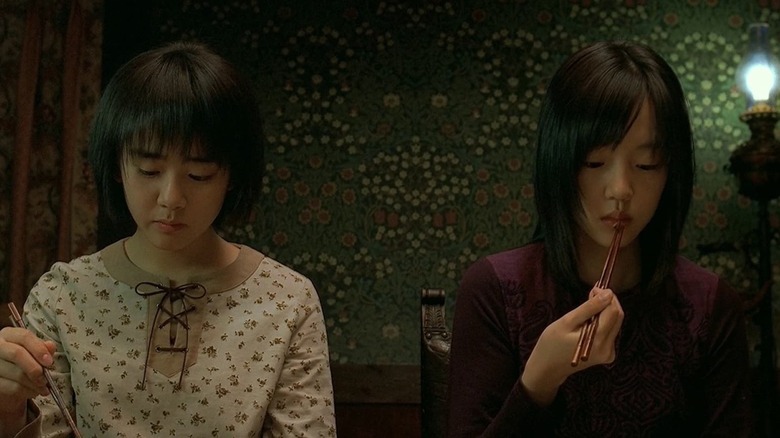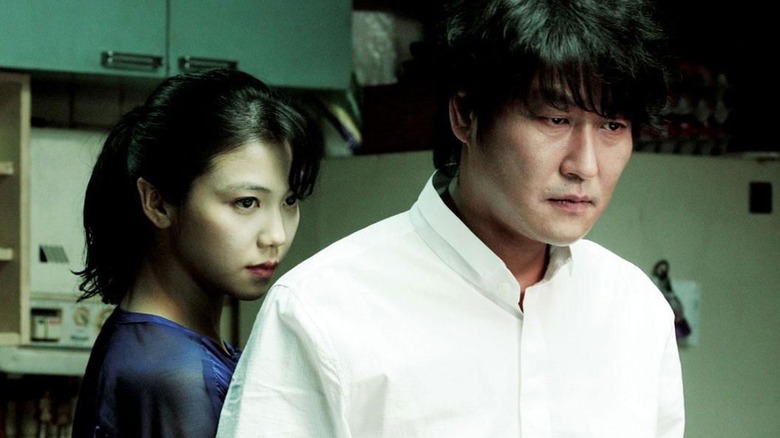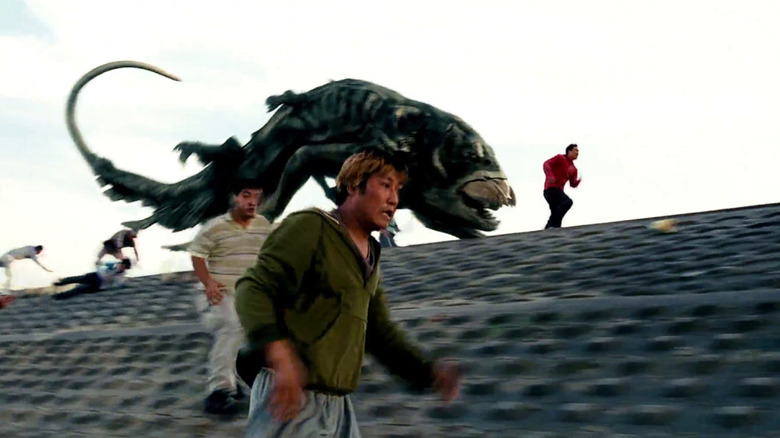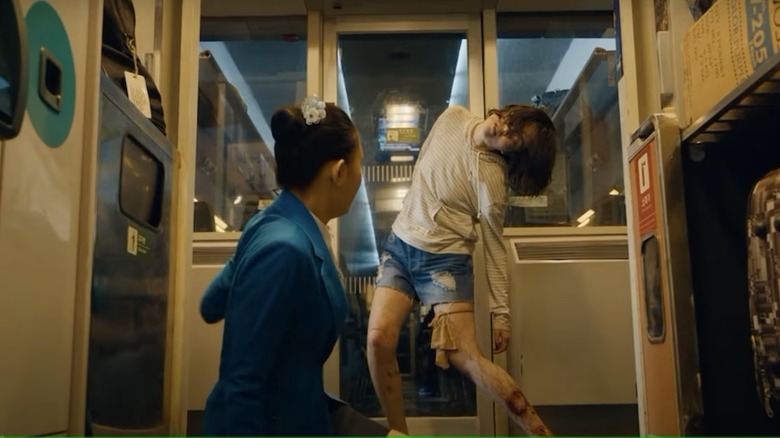15 Best Korean Horror Movies Of All Time
From the immense popularity of "Squid Game" to "Parasite" taking home four Oscars — including best picture — in 2020, Korean films and shows have taken not only the United States but the world by storm in recent years. With it being easier than ever to access global content via streaming services, an especially large spotlight shines on Korean cinema these days, and one of the genres that Korean filmmakers have long proven particularly adept at is horror, both in reinventing existing aspects of the genre and being a trendsetter for filmmakers from other countries to follow.
You may already be familiar with Korean horror movies without realizing it, either by way of crossover hits like "The Host" or in American-made scary movies that are actually remakes of or otherwise inspired by Korean originals. And if you've watched "Squid Game," "Parasite," or other Korean-made productions that have been big hits in the West, you've also already seen a lot of the actors that have fronted some of the best scary stories that the region has to offer. Either way, Korean horror cinema isn't nearly as impenetrable as you may think. From underappreciated Korean horror movies you may have missed to some you might have actually heard of or even seen already, here are the best of the best.
Phone (2002)
When journalist Ji-won (Ha Ji-won) starts receiving menacing phone calls, she initially assumes it's blowback from a scandal she had recently covered. It gets so bad that she has to not only change her number but also move. Yet the calls continue despite getting a new phone number at her new house, and when Ji-won's niece answers one of the calls, the young girl begins acting strangely. Things only get worse from there as Ji-won slowly unravels the unsettling truth behind the unwanted calls.
Though it was overshadowed by similar Japanese horror films of its era like "Ringu" and "Ju-On: The Grudge" — which is fair, as they are two of the scariest Japanese movies of all time — "Phone" is still well worth checking out for its interesting blend of supernatural horror and crime drama with an underpinning of psychosexual elements. It's important to note that this isn't to be confused with "The Phone," a Korean thriller released in 2015 that tells an entirely different story.
Monstrum (2018)
There are a handful of samurai-themed scary movies, but the 15th and 16th centuries as a whole aren't the setting for a particularly high number of horror films. And none have ever been based during Korea's Joseon dynasty of that time period — that is, until 2018's "Monstrum." In the film, the titular creature terrorizes the country, spreading a plague in its wake. While there are many horror movies where you don't see the monster until the end, "Monstrum" opts to reveal its creature early and show it often via its impressive special effects and cool monster design.
"Monstrum" did well at the box office in South Korea, beating out the more well-known monster horror competitor "The Predator," despite sharing the same opening weekend. It might've achieved cult status in the U.S. if it got a big push from Netflix or another streamer, but, sadly, that didn't happen. That said, it's pretty readily available on various streaming services, and hopefully finds its deserved global audience over time.
Seoul Station (2016)
The only franchise to score two spots on this list, "Seoul Station" is the prequel to a certain other Korean horror movie that unsurprisingly did very well in our ranking. While Japanese anime is pretty prolific in the horror genre, animated scary movies from Korea remain incredibly few and far between. But "Seoul Station" isn't only here because it's such a rare specimen — its spot among the greats in the Korean horror movie genre would've likely been secured even if it had a lot more animated competition.
On the surface, it seems like pretty standard zombie fiction fare. The movie shows a man with an open wound wandering around the titular location, and it's easy to see what's going to happen from there. But "Seoul Station" manages to rise above a very overdone, trope-ridden genre through both its emotionally nuanced characters and its absolutely brutal action sequences. With a 100% Freshness Rating on Rotten Tomatoes, it's a must-watch for fans of zombie movies, even those who might normally turn up their nose at a cartoon.
The Quiet Family (1998)
One filmmaker who deservedly has multiple films on this list to represent his talents in this genre is Kim Jee-woon. It's no coincidence that the lowest-ranked of his films is also the oldest, as he managed to get even better after this strong start. "The Quiet Family," the writer/director's 1998 feature film debut, tells the story of a rentable hunting lodge where the renters all seem to befall tragic accidents and what that means for the family that owns the lodge.
While "The Quiet Family" feels like a collection of individual set pieces at times, they do come together and form a cohesive whole. Much of that is thanks to the performances and chemistry of the ensemble that plays the family, especially the matriarch, played by acclaimed Korean actor Na Moon-hee. The way the bumbling clan reacts to and handles the growing number of corpses they have to deal with provides darkly hilarious moments that expertly balance out the scares.
Three... Extremes - Cut segment (2004)
"Three... Extremes" is actually an anthology project consisting of three shorter films from three of the most acclaimed Asian filmmakers of their time, if not ever. While "Dumplings," from Fruit Chan, and "Box," by Takashi Miike, are both well worth checking out, Chan is Chinese and Miike is Japanese. So in the spirit of this feature, the focus will be on South Korea's Park Chan-wook and his contribution to the project: "Cut."
Though he's most famous worldwide for "Oldboy" and "The Handmaiden," Park has also done some great work in the horror genre, and "Cut" is an excellent showcase of his proficiency in that space. The film opens with a director waking up in a room to find that an extra from his films has taken him, his wife, and another extra — a young girl — hostage. The director is told that he needs to murder the young girl, and his pianist wife's fingers will be chopped off one by one until he does so. Against all odds, things only get darker and more twisted from there.
#Alive (2020)
It seems that the zombie apocalypse subgenre of horror is never going to go away, and as long as there are entries like 2020's "#Alive," which find new ways to spin the genre, that's perfectly okay. As the movie's Rotten Tomatoes critical consensus raves, "Well-acted, genuinely unsettling, and occasionally even funny, '#Alive' proves the crowded zombie genre still has fresh stories to tell."
The reason for the hashtag in the movie's title is that it centers around a video game streamer named Oh Joon-woo (Yoo Ah-in) who initially hunkers down alone in his apartment as the zombie infestation takes hold in Seoul. While that might seem like the perfect excuse for a lot of shaky-cam POV, that's, thankfully, not the route that "#Alive"' takes. Instead, the story uses the protagonist's career and his connection to technology and the internet in other, more creative ways. In addition to being a hit with the critics, "#Alive" did very well at the South Korean box office and also did strong numbers globally when it hit Netflix.
I Saw the Devil (2010)
The most recently released Kim Jee-woon project on this list, "I Saw the Devil" might not be the director's best horror movie, but it's still very much top ten-worthy. Starring Lee Byung-hun and Choi Min-sik — best known to American audiences as In-ho from "Squid Game" and Oh Dae-su from "Oldboy," respectively — the movie begins as a traditional revenge thriller but eventually firmly descends into very dark, very depraved horror territory.
Jang Kyung-chul (Choi) is a serial killer who does unspeakable things to his victims, both before and after their deaths. One of his targeted subjects ends up being the fiancée of an intelligence agent named Kim Soo-hyun (Lee), who, of course, eventually uses his particular set of skills to find the man who murdered his wife-to-be. The psychological cat-and-mouse game between the two is some of the most compelling of its type this side of "No Country for Old Men," but it's when the two begin to finally have direct showdowns that "I Saw the Devil" goes full-on horror and never pulls a single punch in doing so.
Bedevilled (2010)
Winning numerous awards at film festivals all across the world, as well as being a box office hit in its native South Korea, "Bedevilled's" critical and commercial success is all the more impressive given that it's the directorial feature film debut of Jang Cheol-soo. Thus far, Jang hasn't done any more horror film work, but he's only in his 50s, so there's still plenty of time. Not that there's anything wrong with crafting one great film in a particular genre and calling that genre conquered, of course.
"Bedevilled" sees a woman named Hae-won (Ji Sung-won) get fired from her job and use her newly available free time to take up an old friend on an offer to visit an island where they have a shared history. But the trip is anything but a vacation, and Hae-won is forced to endure both horrors from her past and entirely new ones. Critics mentioned — as well as praised — the way "Bedevilled" is in no rush to get to the action and instead earns its later scenes of frightening violence after an expertly crafted slow burn of the highest order.
Gonjiam: Haunted Asylum (2018)
While many found-footage horror movies are actually quite good, by 2018, both those types of films and scary movies that take place in old mental asylums had become extremely oversaturated subgenres. And yet, that year saw the release of "Gonjiam: Haunted Asylum," which charged into both of those categories head-on and removed all lingering doubt that anyone might have had about whether either of these storytelling approaches could still be compelling.
In the film, a group of YouTubers who specialize in horror content decide to explore an abandoned mental hospital after two young boys who had previously attempted the same feat go missing. The YouTube channel consists entirely of staged scares, and the crew intends to do the same again — until they discover that faking ghosts and other dangers isn't necessary within the genuinely haunted halls of Gonjiam Asylum. Wi Ha-joon, currently best known as police officer Hwang Jun-ho in "Squid Game," stars as the guy who runs the channel and spearheads the ill-fated expedition.
The Wailing (2016)
Narrowly missing a perfect Rotten Tomatoes score, nearly a decade after its release, "The Wailing" still sits at an incredibly impressive 99% on the site with a critical consensus that raves about the film as "an atmospheric, cleverly constructed mystery whose supernatural thrills more than justify its imposing length." It might seem nearly impossible for a horror movie, of all genres, to come in at a little over two and a half hours and not feel like a single moment could've easily been lopped off, but that's exactly the case with "The Wailing."
When a policeman's daughter is one of many citizens of a small South Korean village to become possessed following the arrival of a mysterious stranger, the officer's first inclination is to try and convince the newcomer to leave. Needless to say, said stranger doesn't simply walk away peacefully — nor do the possessions or their brutal, deadly aftermath cease to occur. In fact, things only get increasingly worse, and what needs to be done to stop the evil doesn't come without devastating sacrifice.
The Housemaid (1960)
Yes, it's a horror movie, but "The Housemaid" is a legendary film in the history of Korean cinema, period. According to respected cinema website KoreanFilm.org, it's generally considered one of the very best Korean movies of all time. With that in mind, it's basically a no-brainer that it should be considered among the best of whatever genre it happens to be part of.
In director Kim Ki-young's "The Housemaid," a married couple hires a housekeeper, and it isn't long before things about the young woman begin to feel a bit off. She eventually blackmails the husband into having an affair with her and becomes pregnant — and that's when things really go frighteningly downhill for everyone involved. To say much more would ruin the chilling experience of watching the movie, which is best appreciated by only knowing the basic premise and then becoming increasingly shocked at the horrific events that unfold one after another. As a note, a Korean remake of the same name was released in 2011 and received a pretty solid reception, but the 1960 original remains far superior and is definitely the one to watch first.
A Tale of Two Sisters (2003)
Another great Korean horror movie that also happens to be one of the best Korean movies of all time, "A Tale of Two Sisters" is the previously alluded-to top horror film from writer/director Kim Jee-woon. It was subsequently remade as the 2009 American horror film "The Uninvited," but to say that movie didn't do the original justice would be an understatement. American audiences at least had a chance to see the superior original as "A Tale of Two Sisters" made history when it became the first Korean horror film to get an American theatrical run.
Based on a well-known Korean fairytale that has served as the basis for multiple films, 2003's "A Tale of Two Sisters" immediately established itself as the best version of the story to be told on screen. It's about two sisters who had been separated for a time when the older one was sent away to be treated at a mental institution. But her reunion with her younger sister isn't an entirely happy one, as there is a new stepmother in the picture that the girls don't get along with. From there, things descend into psychological horror — and that's all we'll say; this is another one that is best enjoyed without knowing any of the movie's gut-punch twists in advance.
Thirst (2009)
When considering the best vampire movies of all time, you'll come up with a mix of the ones that go the more traditional route and those that attempt to modernize or otherwise subvert expectations in some way. And no, we aren't talking about the ones that are set in small-town American high schools and feature vampires that simply glisten in the sunlight rather than being melted by it. One of the best examples, from any country, of a vampire movie that brilliantly upends the tropes of vampire fiction is 2009's "Thirst."
Another entry from director Park Chan-wook, who also co-wrote the screenplay, "Thirst" is about a priest named Sang-hyun (Song Kang-ho) who dies after volunteering to be a guinea pig for an experimental procedure to cure a deadly virus. During the procedure, he unknowingly receives a transfusion of vampire-infected blood and, upon his death, is transformed into one of the immortal creatures. Though he hungers for blood, he tries to maintain his virtuous values — a goal that's complicated when he also finds himself suddenly lusting for the wife of one of his friends. When the two of them give in to their desires for one another, it ends up being way more than either of them bargained for.
The Host (2006)
When it was released in 2006, "The Host" quickly became popular both within and outside of its native country. It spent about a decade being arguably the most well-known crossover hit from Korea, a designation it pretty much retained until the release of the number one film on this list.
The western breakthrough of writer/director Bong Joon-ho, who would go on to earn further acclaim with "Snowpiercer," "Okja," and, of course, "Parasite," "The Host" was Bong realizing his lifelong dream to make a kaiju film — a genre he'd loved since he was a kid. That affection shined through in one of the best love letters to the genre of the modern era, if not of all time. Like many kaiju movies, the events of "The Host" are set into motion when a major water source is contaminated and creates a deadly monster. It might not have earned him his first Oscar, but "The Host" did win nearly 30 awards from various other organizations and outlets across the world for both the director and his cast.
Train to Busan (2016)
As much as lists like this love to reveal a big, shocking number one entry, it's pretty much impossible not to make the obvious choice here: "Train to Busan" is the best Korean horror movie of all time, bar none. And, yes, it's the movie that the aforementioned "Seoul Station" is the prequel to. That being said, it should also be mentioned that there's a sequel to "Train to Busan" called "Peninsula," which is fairly decent but hardly essential.
As for "Train to Busan" itself, the Rotten Tomatoes critical consensus states that it "delivers a thrillingly unique — and purely entertaining — take on the zombie genre, with fully realized characters and plenty of social commentary to underscore the bursts of skillfully staged action." As proven by movies like "The Taking of Pelham One Two Three" (the 1974 original), fellow Korean classic "Snowpiercer," and the epic Doc Ock fight in "Spider-Man 2," trains are a great place to set action set pieces — and doubly so when zombies are involved. The next time it hits one of the streamers, make the time to catch "Train to Busan." It's that rare movie that you constantly hear is the coolest thing ever that actually ends up being the coolest thing ever when you finally watch it yourself.
